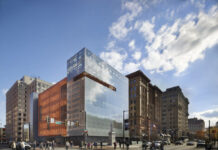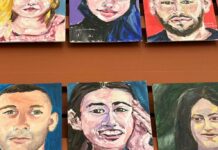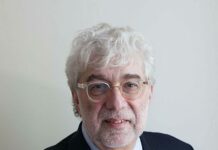
Rebecca Krasner, the new director of education at the Weitzman National Museum of American Jewish History in Philadelphia, welcomed a school group to the museum on Oct. 11. It was just days after Hamas attacked Israel.
What would she say?
“My name’s Rebecca. I’m Jewish. The first thing you’ll hear in this museum is the story of the Jewish people, the diversity of the Jewish community and our stories. I am a Jewish American, and right now my heart is breaking.”
“And I stopped there,” Krasner said two days later in an interview.
“I don’t believe our job is to educate about geopolitics,” she explained. “But to uplift the stories of Americans who are affected by what’s happening in Israel.”
Krasner, 43, served as associate director of education before ascending to the big role. She wanted it because it’s important to her to deepen the understanding of Jewish America to both Jewish and non-Jewish groups.
A Perelman Jewish Day School group visited the museum on Oct. 15. But many classes visiting the Weitzman are not from day schools. There are visitors from the School District of Philadelphia, Delaware County and New Jersey, among other places. Those who come from outside the Jewish community often have never met a Jewish person, according to Krasner.
It’s her job to fill that knowledge void.
“If I have an hour with eighth graders, that’s precious time,” Krasner said. “The message I want them to leave with is Jewish Americans are thriving. Jewish Americans are a beautiful people.”
It’s a mission that has taken on a new importance. In the wake of Hamas’ attack, anti-Israel posts have flooded social media. Hamas called for a “global day of jihad.” Pro-Palestine marches have unfolded in Philadelphia, New York and other cities.
“My work as director of education is to offer an alternative narrative to what people see on social media and other assumptions they make,” Krasner said. “Most students in the U.S. learn about the Holocaust and then little to nothing else about Jewish people.”
The Weitzman has “an amazing collection from one woman who migrated here in the early 1900s,” Krasner said. The museum has her passport, a family photo, a needlepoint she worked on during her journey to America, a memo book in which she practiced English, her board of education cards for night school and the flag she got when she became a citizen.
The woman’s name is Eva Baen. Her granddaughter became a rabbi.
“They learn that story,” Krasner said. “Through that story, they learn an entry point to Jewish immigration here.”
Krasner wants to emphasize those types of stories to help non-Jews understand what it means to live in a democracy. Democracy is “about living among people who are different from you,” she said.
“Embracing people who are different from you,” she added.
It’s a lesson the 43-year-old learned as a teenager. Krasner grew up in a Modern Orthodox community in New York City. She went to day school and attended Jewish summer camp.
“It gave me a strong base of love for our people, our traditions, our rituals,” she said.
But when Krasner was 16, her 29-year-old brother came out as gay. He was no longer welcome in the Orthodox community.
“That was painful,” she said.
And as she grew a little older, her sister, Haviva Ner-David, 11 years her senior, gained a private rabbinic ordination after being rejected from Yeshiva University. The older sister spoke out in The New York Times and other places about “wanting feminism to be in Orthodoxy,” Krasner said.
Then in college at Boston University, Krasner met Abe Friedman, now the rabbi at Temple Beth Zion-Beth Israel in Center City. The future rabbi was Conservative, and the couple started bonding over their shared love for Jewish texts but also their love for debating them.
They’ve been married for 20 years. If you walk into their home on the Sabbath, you will find the couple and their children eating dinner with their phones away and candles lit.
After dinner, they may read or play board games together. Then in the morning, they go to services and share a meal with friends. Friedman’s synagogue, BZBI, is Conservative.
“The commitment to ritual is important to me. And doing it in a space that is embracing of all people,” Krasner said. “Wanting to raise my children in a community where all adult men, women, nonbinary folks are all seen as completely equal. It’s something I’m not willing to compromise on.”






